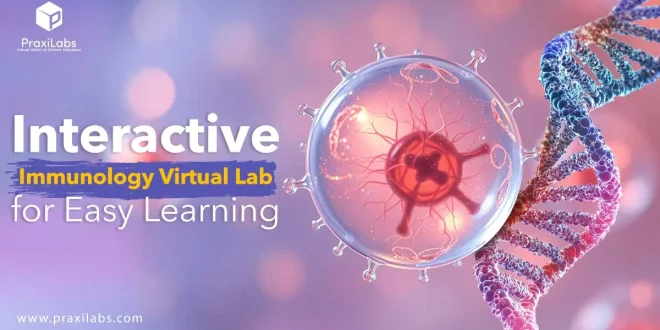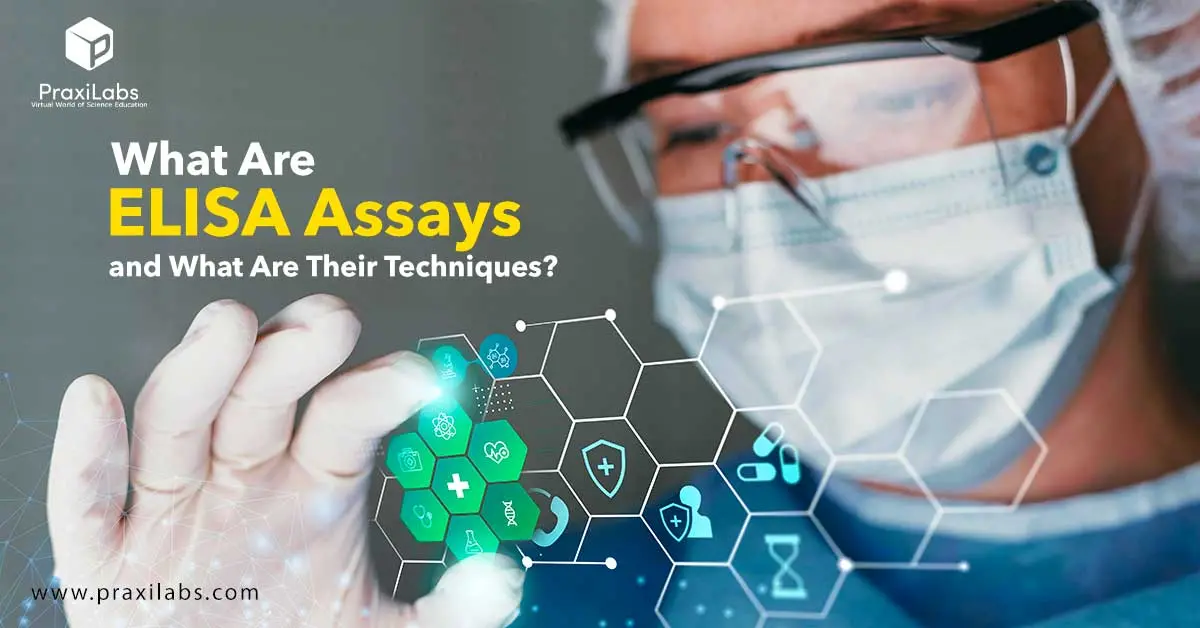Last Updated on July 1, 2025 by Muhamed Elmesery
In today’s fast-paced scientific world, hands-on lab experience is essential for understanding complex biological processes, especially in fields like immunology, and the immunology virtual lab can provide this valuable support.
This innovative digital platform allows researchers and students to replicate actual lab experiments and see how the results are obtained.
In this article, we’ll explore what the immunology virtual lab is, its primary goals, and how it facilitates learning through advanced simulations, such as ELISA.
We’ll also highlight the benefits of using such virtual tools and discuss why they’re growing to be a popular option for both institutions and students.
Table of Contents
What Is the Immunology Virtual Lab?
An immunology virtual lab is an engaging, usually computer-based learning tool that lets users experiment and study immunology ideas and methods in a virtual setting.
These laboratories provide a virtual environment for learning about different immunological processes, simulating experiments like the ELISA method, and investigating antibody-antigen interactions.
These laboratories are intended to serve as educational resources, assisting students in grasping the fundamentals of immunology and the use of certain methods, such as ELISA principle, in medical diagnosis.
What Are the Objectives of the Immunology Virtual Lab?
An immunology virtual lab’s main goals are to improve understanding of important immunological concepts and replicate actual laboratory activities. These objectives include:
Examining the ELISA Method and Antibody Detection
Students discover how to identify and quantify certain antibodies in a blood sample using the Enzyme-Linked Immunosorbent Assay (ELISA) technique, which helps with disease diagnosis.
Knowing how antigens and antibodies interact
The way antibodies attach to particular antigens and trigger different immunological reactions may be simulated and explained in the lab. This aids in learning how germs are recognized and eliminated by the immune system.
Understanding the Mechanisms of the Immune System
The lab can model the immune system’s development, the way immune cells work together to protect the body against infection, and the effects of immune system dysfunction.
For more understanding, You can try PraxiLabs virtual lab .. Create your free account now and try it!
What Are ELISA Assays, and What Are Their Techniques?
ELISA is a lab technique that is used in the immunology lab to identify and measure certain molecules, including hormones, antibodies, or antigens (proteins).
The detection and measurement of the target molecule in a sample depends on a highly specific antibody-antigen interaction.
Techniques used:
- Immobilization: A solid surface, usually a microplate well, is used to immobilize the target antigen (or antibody).
- Antibody Binding: The well is filled with a particular antibody that attaches itself to the target molecule.
- Enzyme Reaction: Unbound molecules are removed, and then a substrate is introduced. This substrate interacts with the enzyme to produce a visible signal, usually a color change.
- Measurement: The quantity of the target molecule in the sample is directly correlated with the signal’s strength, which is usually determined using a plate reader.
Benefits of Using the Immunology Virtual Lab
There are several benefits of using a virtual immunology lab, including:
- Dynamic Visualization: By enabling students to observe complex immunological processes in action, virtual labs can make abstract ideas more relatable and understandable.
- Repetitive Practice: Students might do experiments again and investigate other circumstances to reinforce their comprehension.
- Cost-effective: A greater variety of institutions and students can use online biology labs, since they might be less expensive to create and operate than physical labs.
- Safety: Without the dangers of real-world laboratories, such as exposure to potentially dangerous materials or contamination, virtual biology lab offer a secure setting for students to practice protocols and conduct experiments.
Examples of Immunology Virtual Experiments in Praxilabs
Virtual immunology laboratories provide simulations of different immune system-related methods and ideas.
Students can digitally conduct studies and investigate immune system processes using ELISA tests, antibody labeling, and pathogen interactions with the body.
ELISA Assays immunological virtual experiments include the following examples:
- Flow Cytometry: This method uses DNA-binding dyes to analyze the characteristics of cells.
- Immunofluorescence Assay: This method helps users learn how to perform cell fixation and practice the ‘washing technique’ skill.
- Sandwich ELISA: Uses a double antibody system, usually labeled with an enzyme, to detect the antigen and trap it.
- The ELISPOT Assay: Looks for areas where B cells have generated antibodies to identify and measure individual antibody-secreting B cells.
Why Choose PraxiLabs for Virtual Immunology Tests?
PraxiLabs is one of the top providers of virtual scientific laboratories, offering interactive and user-friendly 3d science experiments that brings complex immunology concepts to life.
PraxiLabs enables students of all abilities to access and enjoy virtual learning. It allows students to effectively and securely perform processes like ELISA tests since it closely resembles actual lab settings.
PraxiLabs is a flexible instrument for educators and institutions since it is intended to facilitate both individual study and classroom engagement.
Selecting PraxiLabs gives consumers access to dependable, reasonably priced, and educationally effective virtual immunology experiments that improve retention and understanding.
Conclusion
The immunology virtual lab offers a creative, accessible, and efficient method for improving immunology teaching through hands-on digital simulations.
This is further enhanced by tools such as PraxiLabs, which provide excellent, interactive experiences that closely resemble standard laboratories, enabling instructors and students to investigate immunology more thoroughly and flexibly.
Virtual labs are proving to be a priceless tool in closing the gap between theory and practice and helping students in their educational journey.
Pick the Best Virtual Plan For You
Frequently Asked Questions
What are the most important limitations of ELISA?
ELISA immunology can be impacted by a restricted dynamic range for precise measurement, sensitivity limitations in detecting low concentrations, and cross-reactivity that results in false positives. It also takes a lot of time, effort, and high-quality antibodies.
Additionally, because ELISA is often a single-target test, it is not the best method for detecting numerous analytes at once.
Does the virtual Immunology lab give accurate results?
Depending on the simulation type and application, immunology virtual labs can provide accurate results. For example, an ELISA virtual lab may be designed to produce results that are comparable to those seen in an actual laboratory.
However, virtual labs might not always accurately capture the complicated details and nuances of actual immunology research.
 PraxiLabs A virtual world of science
PraxiLabs A virtual world of science







